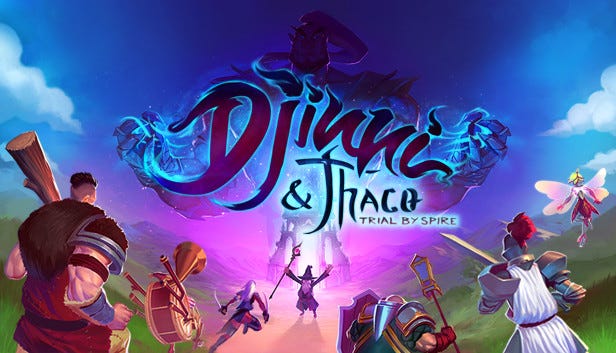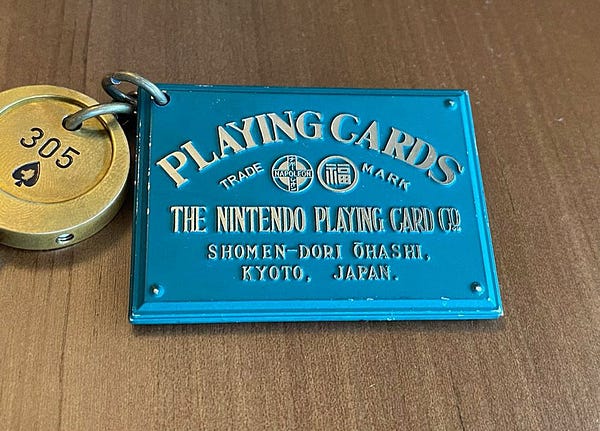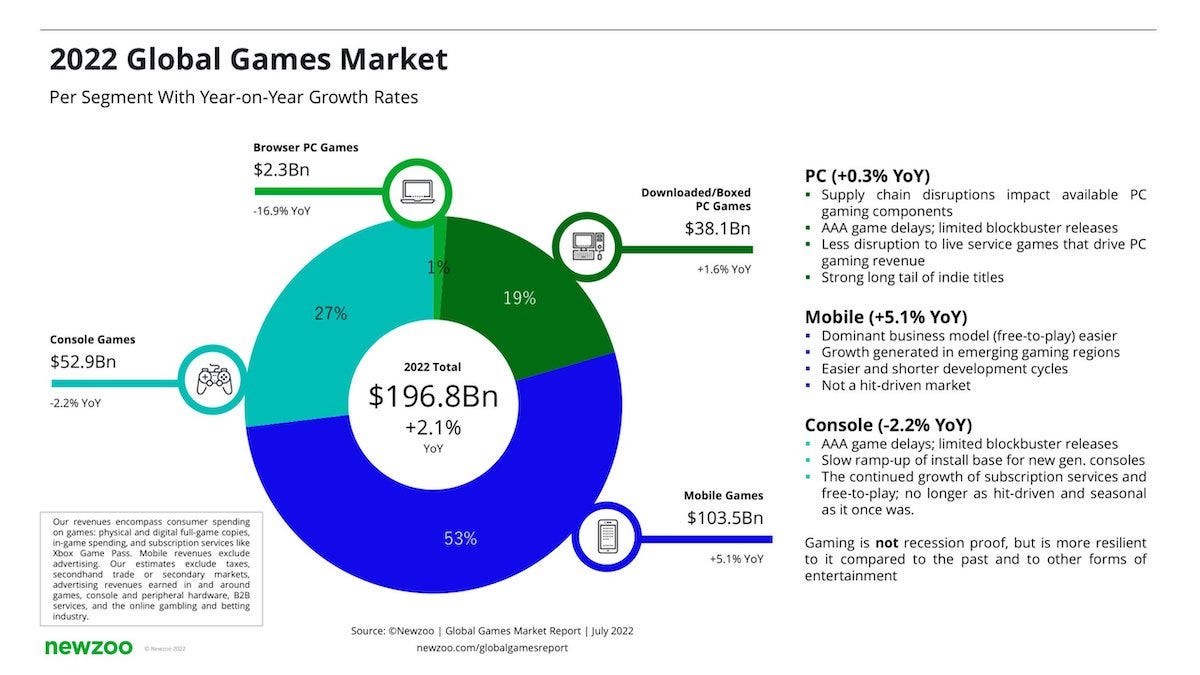Stadia's demise - did it have to happen?
Publikováno: 3.10.2022
Also: Steam's antitrust lawsuit gets spicier, and lots more!
[The GameDiscoverCo game discovery newsletter is written by ‘how people find your game’ expert & company founder Simon Carless, and is a regular look at how people discover and buy video games in the 2020s.]
We’re back in the land of the living - and how is it October already? - to bring you Monday’s free, spoopy GameDiscoverCo newsletter, kind readers. And good luck to all of you with games in Steam’s October Next Fest, which kicked off just hours ago!
Oh, and, only 36 hours left for our 25% off a GameDiscoverCo Plus paid subscription deal. You get an exclusive Friday PC/console sales trend newsletter, a member-only Discord, a Steam ‘Hype’ & performance interactive data set, eBooks, & lots more. Thx!
Exit stage right, Stadia - what did we learn from it?

So I briefly considered not making the lead story in today’s newsletter Stadia, given that the ‘hot takes’ and kickings that Google’s cloud platform got since Phil Harrison’s ‘message about Stadia’s long term streaming strategy’ on Thursday are.. substantial.
But now the shock has died down a little bit, we can move to the next stages of Kubler-Ross’ five stages of grief. (Though I guess ‘denial’ wasn’t ever on the table, given the general drift of Google’s video game cloud streaming service in recent months.)
And there’s been quite a few good things written about why Google Stadia did not, in fact, work out. So let’s go through some of the key inflection points:
People like (or may like in the future!) cloud gaming, but not in the way Stadia provided it: Eurogamer’s Martin Robinson points out that during Cyberpunk’s launch, Stadia “was your best bet for an affordable [next-gen] experience”, but: “part of the problem was Google expecting everyone to make the switch to an all-new [cloud-first] ecosystem, when shifts in gaming habits are never quite so stark.”
Stadia’s subscription structure wasn’t attractive to end users: As Bryant Francis comments in a great op-ed for GameDeveloper.com: “Players do not want to pay one monthly subscription for permission to have to pay full price for games on the platform (or pay for a second subscription to access a limited library of games).” This… actually seems like as much of an issue to me as the cloud one?
Lack of trust in Google exacerbated the ‘cloud ownership only’ roadblock: TechCrunch’s relatively poke-y editorial says: “While it’s true that rivals like Geforce Now and Xbox Cloud Gaming presented entrenched competition and that Google knows next to nothing about gaming, the main trouble… is that no one trusted them to keep it alive longer than a year or two.” ‘Core’ gamers definitely worried about this…
Big upfront spend, then a slow launch vs. internal goals: expectations were so high that even big publisher Stadia non-exclusives didn’t justify the $, when things didn’t scale: Bloomberg’s Jason Schreier mentioned he’d heard Google paid out “tens of millions of dollars PER GAME for Red Dead 2, Assassin's Creed, etc”
Bigger ‘from scratch’ internal and external projects never made it to the finish line: The early 2021 pivot when internal Stadia studios closed, and third-party titles like The Quarry and High On Life got ‘let go’ to launch multi-platform ensured there wouldn’t be Stadia exclusives that made a difference to the platform. The slow fade-out started then.
Ultimately, as Eurogamer’s Robinson explains: “Xbox has the perfect solution in place [for cloud streaming]… by adding streaming to an existing subscription and giving it as an option people can try without any extra fuss or cost.”
In 2022, cloud streaming works only as part of a bigger platform ecosystem. And Google was trying to build an entire business from scratch - a bit too swiftly - just on the (admittedly high-quality!) streaming tech. And it had some odd, not that attractive subscription and game pricing decisions baked in to the whole caboodle.
It wasn’t an inevitable demise, but I don’t think a turnaround was coming. So general belt-tightening at Google came for the service earlier than many expected. The sudden closing caught many smaller devs unawares - and I trust Stadia will help out anyone who was expecting that revenue in some way.
Oh, and a shout-out to some of the ‘regular’ staff working in dev relations at Stadia. We heard they were doing a great job of being helpful & responsive, and it’s unfortunate it was ‘full speed ahead’ for them until… it wasn’t.
Valve’s antitrust lawsuit gets some Dark Catt ‘help’

We’ve covered the U.S. antitrust lawsuits against Steam creator Valve in-depth a couple of times now - firstly on May 9th, and then a follow-up later that week (scroll down, it’s the second item in the newsletter.)
Basically, the lawsuits - of which there were two, and are now one, are now getting deep into ‘discovery mode’, with orders (.PDF) explaining exactly how email threading and de-duplication is going to work for the millions (!) of electronic documents that will be combed through ahead of a trial. (Wow, this is an expensive endeavor.)
But an interesting new document popped up (.PDF) on September 23rd. It’s Valve’s official reply to the 115 page (!, PDF) ‘consolidated amended class action complaint’ that happened when Wolfire & Dark Catt combined their suits recently.
Largely, it’s a list of paragraphs in the complaint and an official ‘does Valve deny this or not?’ boredom-fest - important for setting trial boundaries. But notable is this:
Some basic facts are re-established. You may not be surprised but: “Valve admits that Steam is Valve’s largest source of revenue…. Valve admits that it recorded 120 million active monthly players, 24.8 million peak concurrent users, and 2.6 million new purchasers per month in 2020.”
Wolfire’s allegations are vague (so far), but understandable: The best we have thus far is that a Valve rep told Wolfire’s owner - in a phone call - “that it would delist any games available for sale at a lower price elsewhere, whether or not using Steam keys.” Valve’s response is that yes, this call “took place on December 3, 2018, but [it] denies Plaintiffs’ allegations of the content of the call or what transpired during it.”
Dark Catt’s allegations are being majorly disputed: the suit says that Dark Catt “offered its game for a temporary lower price on Humble Bundle than the Steam price and shortly thereafter was banned from Steam.” In fact, Valve says: “Valve barred Dark Catt’s offerings from Steam because Dark Catt manipulated reviews of its games in violation of the Steamworks Documentation and Valve terms.”
This gives Valve an opportunity to go on the offensive: why should this antitrust case be dismissed? Valve cites the amazingly named ‘doctrine of unclean hands’, since: “Dark Catt’s review manipulation, which was a clear violation of Steam’s policies, included without limitation at least four glowing reviews of Dark Catt’s own game that Dark Catt posted in an attempt to mislead the public and boost sales.” Oh dear.
We covered Dark Catt’s alleged review manipulations in that May 11th newsletter - they seem fairly clear to me. So, from the Wolfire legal team’s perspective, having to join the cases has added a certain amount of unfortunate legal weakness here.
Despite this, I’m not sure the case is going to get dismissed. So the discovery process is really going to need to turn up additional things that would lead us to believe that Valve is obviously, solidly‘doing a big antitrust whoopsie’, for Wolfire & friends to win.
(And what even happens then? Not a big fan of this case, since the only obvious practical result I see would be Valve taking away Steam keys, which isn’t… good?)
The game discovery news round-up..
And welcome to our game discovery round-up, starting with this rather useful ‘state of the game biz in 2022’ Newzoo chart (spotted by Derek Strickland) that’s part of Embracer’s recent AGM presentation (.PDF.) But look - here’s what else we have:
According to Bloomberg, Sony “plans to make 2 million units of the PlayStation VR2 headset by March next year”, and production began in September and “hasn’t yet faced supply chain constraints.” We’re skeptical that PSVR2 will be a breakout hit, but it could be a decent supplemental platform over time?
The era of $70 games is almost upon us, notes this Kotaku piece, documenting upcoming 2022/2023 titles like Gotham Knights, Call of Duty Modern Warfare II, The Callisto Protocol, Dead Island 2, Hogwart’s Legacy, Wild Hearts and Skull and Bones which all plan to launch at the $70/70 Euros price point.
Couple of neat Steam Deck things: firstly, KDE's David Edmundson may have slipped that Deck has now shipped over 1 million units in a Linux tech-related talk; secondly, the biggest games played on Deck in September include Vampire Survivors (duh!), Elden Ring, Stardew & Cyberpunk.
Following up our newsletter on TemTem’s ‘tightrope walk’ with paid game & Battle Pass, we spotted other games that also had issues convincing players. Happy Volcano’s You Suck At Parking has had some loud complainers for the same thing, Unknown Worlds’ Moonbreaker had similar - “a $30 Early Access game shouldn’t have micro transactions baked into the system.” And FIFA 23’s Eurogamer review cites the “vice-like grip of profiteers” on the game’s monetization.
Submissions are now open for the 2023 Independent Games Festival, which I used to help run, so aren’t unbiased. But I still think it’s a great ‘peers loved your game’ awards experience. Aura has a very useful ‘tips for submitting to the IGF’ thread if you want to do so…
Gunfire Reborn is the latest game to very publicly increase its Steam price in Turkey, saying: “Sales in Turkey are 2-3 times larger than the number of players in the region, but pricing in Turkey is only one-fifth of the price in the United States”, and that Steam interventions didn’t help. (Reminder: Dead Cells also did this for both Turkey and Argentina in August.)
Microlinks: an adult visual novel game barred from Steam - Spike Chunsoft’s Chaos;Head Noah is still launching on Switch, intriguingly; Overwatch 2 will require a phone number to play - even if you’ve played the original ; how and why should you make a game trailer fit into existing marketing materials?
Did you stop getting email reminders from Valve to input discounts or apply for Steam sales? Janek from Frogsong Studios asked, and it turns out: “The [Steamworks] emails are now only sent to members of the partner who have a specific permission in Steamworks (name of the permission: Receive Steamworks Communication.” So make sure everyone who wants those emails has that ticked!
On the VR end of things, we know Quest Pro is coming soon. But what’s next? Rumors written up by RoadToVR from a YouTube video made by the leak-curious SadlyItsBradley claim “a ‘lower-end’ consumer headset that follows in the footsteps of Quest 2, ostensibly called Quest 3”, and to debut in 2023. We’ll see, huh?
Microlinks: October’s Prime Gaming set of free vidya games includes Fallout 76, Total War: Warhammer II & more; some don’t like that the newly-launched PlayStation Stars loyalty program offers better customer support to players on the highest tier; consumer spending in mobile games fell 12.7% year over year to $19.3 billion in Q3, youch.
Finally, did you know the original Nintendo offices into Kyoto have been refurbished into a boutique hotel? They certainly have, and it seems like a very tempting visit:



[We’re GameDiscoverCo, an agency based around one simple issue: how do players find, buy and enjoy your premium PC or console game? We run the newsletter you’re reading, and provide consulting services for publishers, funds, and other smart game industry folks.]
